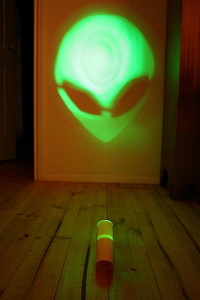
Source: Mr_Spock, em_on_flikr, Flickr
The Star Trek character Mr. Spock is known for his logical thinking. His conclusions and arguments are based on logical evidence, sound reason, and facts. When writers use logic to support their texts, they emphasize sound reasoning or facts or both. They may also use their logic to support or reject the conclusion of an argument.
Read the following article which appeared in the New York Times. Although there are few facts to support the author’s argument, he builds a case by using sound reasoning and logic.
Will the Aliens Be Nice? Don’t Bet On It
By Gary Gutting
The Stone, [which features the writing of contemporary philosophers on issues both timely and timeless] is featuring occasional posts by Gary Gutting, a professor of philosophy at the University of Notre Dame, that apply critical thinking to information and events that have appeared in the news.
The probability that there is intelligent life somewhere other than earth increases as we discover more and more solar systems that seem capable of sustaining life. The thought that there might be extraterrestrial intelligences (ETI) somewhere out there excites us and has led to organized efforts to contact any such beings. We have sent space probes with data about us, and we transmit signals with a structured content (like symbols expressing mathematical formulae) to what we hope will be an intergalactic audience. The search for extraterrestrial intelligence project (SETI) is obviously based on the assumption that the possible benefits of contact with ETI outweigh the possible harms. But do they?

Source: Alien 1, rarebeasts, Flickr
A recent study by researchers at Penn State and NASA provides a useful outline of the various ways that encounters with ETI could be beneficial, neutral or harmful to us. The study faces up to the most chilling possibilities: ETI might “eat us, enslave us, attack us,” inadvertently infect us with horrible diseases or just decide to eliminate us for the greater good of the universe. (Regarding this last point, the report is especially concerned that ETI might be at least metaphorically green and see us a threat to the universe’s ecology.)
The report draws no conclusions about the wisdom of pursuing SETI, though it does urge the need to develop quantitative measures of possible harms and benefits. Its final sentence seems content with the idea that we will “continue the search for extraterrestrials into the future.” Especially after reading the report, I am not so content.
What is likely to happen if we make contact with ETI? Given the size of astronomical distances and assuming the speed of light as the maximum possible velocity, the most likely outcome is not real contact but merely an exchange of messages, perhaps at very long intervals. Little chance of harm there.
But there is still non-zero probability of real contact. Since we have no way of predicting with any certainty the outcome of such contact, it might seem that we have no reason to assume a bad rather than a good result. From this we might conclude that there is no objection to pursuing SETI, if only to satisfy our curiosity.
But we do know this: for the foreseeable future, contact with ETI would have to result from their coming here, which would in all likelihood mean that they far surpassed us technologically. They would be able to enslave us, hunt us as prey, torture us as objects of scientific experiments, or even exterminate us and leave no trace of our civilization. They would, in other words, be able to treat us as we treat animals — or as our technologically more advanced societies have often treated less advanced ones.
We cannot know what might happen to us from contact with ETI. But we do know that there may well be unthinkably horrible outcomes that are not likely to be offset by potential benefits. We should not take the SETI bet.
- Which of the following is not a fact presented in the article?
- Based on the reasoning in the excerpt, which of the following conclusions is the most logical?
Do you see how logical evidence worked in this excerpt? The author thought about possible outcomes using sound reasoning based on what we currently know. In the article, you were presented with expert opinion from a study conducted by NASA and Penn State. Notice that these were not “facts” but “expert opinions” based on current technology and logical reasoning. Given this information, the writer came to this conclusion through the use of logical evidence: if we discover life elsewhere in the cosmos, it may be more harmful than beneficial. Logical evidence is based on sound reasoning.